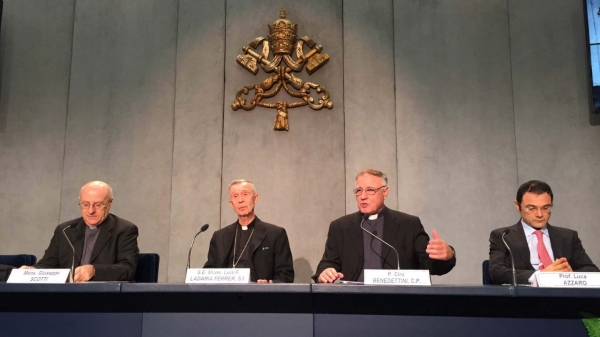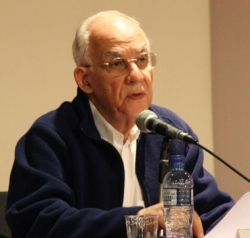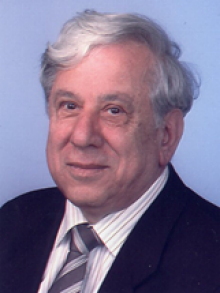(16/11/15) The Brazilian Jesuit Mario de França Miranda and the Lebanese Nabil el-Khoury will be awarded with the Ratzinger Prize 2015, on 21st November in the Royal Hall of the Apostolic Palace. Their names were announced this morning during the Press Conference at the John Paul II hall, in the Press Room of the Holy See.
Mario de França Miranda (Rio de Janeiro, Brazil, 1936). Jesuit priest, full professor of Theology at the Pontifical Catholic University of Rio de Janeiro. He was member of the International Theology Commission.
Nabilel-Khoury (Mtaile – Chouf, Lebanon, 1941). Professor of Philosophy and Comparative Literature at the Université Libanaise of Beirut and the University of Tubingen. He translated the Joseph Ratzinger’s Opera Omnia in Arabic.
“This choice means that the Vatican Foundation is widening its horizons – as the archbishop Luis Francisco Ladaria affirmed. He is secretary of the Congregation for the Doctrine of the Faith and member of the Scientific Committee of the Vatican Foundation and he will give the prize. – Since the first time, this award was given to theologians coming from different countries: Italy, France, Spain, Germany, Great Britain, Poland, United States. Due to the ecumenical spirit of the Foundation, this significant award was also given to representatives of non Christian faiths”.
“This year the two award-winners are catholic, but none of them is part of the so-called ‘Western world’. One is from the Latin American area, the other belongs to the Eastern Catholic world. All people will understand the choice. Latin America has given the Church the first non European Pope and the Church has definitely showed its catholic values. The importance of the East for the Church was stressed by Pope John Paul II a lot of times: he used to say that the Church must breathe with two lungs, the East and the West. In the apostolic letter Orientale Lumen he said that we have to know the two great traditions better”.
The president of the Foundation, Msgr. Giuseppe A. Scotti, reminded that “Bydgoszcz, Rio de Janeiro, Rome, Medellin, Madrid – seats of the Congresses of the Foundation – are other parts of the same path that involved at least 500 Universities and more than 10.000 teachers and students from Europe, Africa, Latin America. These events have also promoted the exchange of good experiences for a better future. A future in which man and God are able to interact and give life to the mankind, because we have to be ready to meet the living image of God, as Benedict XVI has said. This means that it is possible to meet God and to create life. Pope Francis said some days ago in Florence: “Christian doctrine is able to trouble but also to inspire us. It has got a face that is not rigid, it has got a body that moves and develops, it has got a soft flesh: it is called Jesus Christ.”
While he was analysing the Opera Omnia of Joseph Ratzinger – Benedict XVI, the executive secretary of the Foundation and translator of the Opera Omnia Pierluca Azzaro affirmed that the recently published book Gesù di Nazaret – Scritti di cristologia (second tome of the sixth volume) “concerns the writings Benedict XVI has dedicated to the main topics of Christology, and to the several aspects of the great mystery of Jesus Christ, such as: Revelation, Salvation, Resurrection, Redemption. The next volume of the Opera Omnia to be published will be about the Second Vatican Council.



